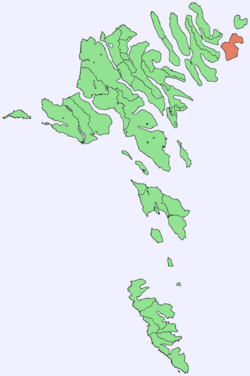Svinoy
| Svínoy | |
|---|---|
| Island | |

Stamp FR 350 of Postverk Føroya (issued: 25 May 1999; photo: Per á Hædd)
|
|
 Location within the Faroe Islands |
|
| Coordinates: 62°16′N 6°22′W / 62.267°N 6.367°WCoordinates: 62°16′N 6°22′W / 62.267°N 6.367°W | |
| State | Kingdom of Denmark |
| Constituent country | Faroe Islands |
| Area | |
| • Total | 27.1 km2 (10.5 sq mi) |
| Area rank | 10 |
| Highest elevation | 586 m (1,923 ft) |
| Population (2007) | |
| • Total | 52 |
| • Density | 1.9/km2 (5.0/sq mi) |
| Time zone | GMT (UTC+0) |
| • Summer (DST) | EST (UTC+1) |
| Calling code | 298 |
Svínoy (Danish: Svinø) is an island located in the north-east of the Faroe Islands, to the east of Borðoy and Viðoy. It takes its name from Old Norse, Svíney, meaning "Swine Isle". Svinoy also refers to a section of the ocean where North Atlantic water flows into the Norwegian Sea. There is a similarly named island, Swona, in the Orkney Islands.
Svínoy is divided into two unequally sized peninsulas. The coast is mostly steep slopes and cliffs, including the 345-metre (1,132 ft) precipice of Eysturhøvdi on the north coast. It has only one settlement, also named Svínoy, where all the inhabitants live.
The coastline of the island has been identified as an Important Bird Area by BirdLife International because of its significance as a breeding site for seabirds, especially European storm petrels (25,000 pairs), Atlantic puffins (10,000 pairs) and black guillemots (100 pairs).
There are seven mountains on Svínoy:
Svínoy village
Svínoy
The coast of Svínoy
Svínoy in 1899
...
Wikipedia
